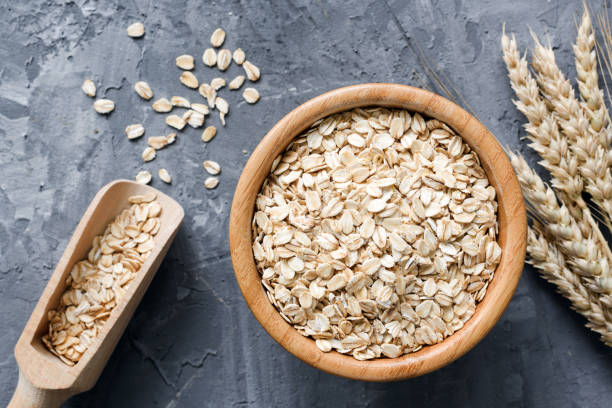By Deborah Bamisaye
Dele walked into his kitchen, still thinking about PharmaTimes, a health magazine he’d just read. As he poured himself a simple bowl of oats and adding other healthy ingredients, he paused for a while, stirring at his food – when suddenly, his imagination took a flight:
Oats: “Hey Cinnamon, have you ever wondered why people drag me into their heart and sugar health matters?”
Cinnamon: “Oh, I know! You’re a powerhouse with that secret weapon – beta-glucan, right? You slow down digestion, lower cholesterol, and keep blood sugar steady. That makes you a humble but desired grain.”
Oats: “Exactly! But I can’t do it all alone – I love when you and nuts join in. Together, we form an unbeatable team that fights heart disease, diabetes and even more.”
Cinnamon: “It’s true. When we’re combined with fruits and seeds, we’re like an army of health warriors, reducing inflammation and giving energy that lasts.”
Oats: “So, the next time someone scoops me into their mouth, I hope they remember – they’re not just eating breakfast; they’re unleashing a secret weapon against chronic illnesses!”
Dele smiled, marveling at the lively team assembled right in front of him. The magical scene slowly melted away as he snapped back to reality. But his heart felt lighter, filled with hope, he picked up his spoon and started consuming his meal. Now he knows he wasn’t just eating oats, he was unleashing a secret weapon against diseases and choosing a healthier, stronger future – one delicious spoonful at a time.
Why Oats?
Oats have long been celebrated as a nutritious whole grain, but their true power lies in their remarkable ability to combat some of the most prevalent chronic illnesses today, especially heart disease and type 2 diabetes. Central to these benefits is a unique type of soluble fiber called beta-glucan, which has been extensively researched and recognized by major health authorities worldwide for its disease-managing properties.

Heart Disease Defense
Cardiovascular disease remains a leading cause of mortality globally, often driven by high levels of LDL (bad) cholesterol and impaired blood vessel function. Oats’ beta-glucan forms a thick, viscous gel in the gut that binds to bile acids – a substance made from cholesterol – and facilitates their excretion from the body. This process prompts the liver to use more cholesterol to produce new bile acids, effectively lowering the circulating LDL cholesterol in the blood. Clinical studies show that consuming at least 3 grams of oat beta-glucan daily can significantly reduce LDL cholesterol levels, thereby lowering the risk of coronary heart disease. These cholesterol-lowering effects have earned approvals from respected bodies such as the European Food Safety Authority and the U.S. Food and Drug Administration, reinforcing oats as a heart-healthy food choice.
Blood Sugar Balance and Diabetes Management
Type 2 diabetes involves elevated blood sugar due to insulin resistance or impaired insulin production. Oat beta-glucan’s gel-like consistency also slows the digestion and absorption of carbohydrates, leading to a more gradual rise in blood glucose after meals. This modulation helps prevent sharp spikes that stress the body’s insulin response, supporting better glycemic control. Research indicates that about 4 grams of beta-glucan per serving of carbohydrate is effective in reducing postprandial blood sugar levels. Additionally, oats may improve insulin sensitivity, further helping to manage or prevent diabetes through regular consumption.
Gut Health and Beyond
The benefits of oats extend beyond heart and metabolic health to the gut microbiota. The fiber in oats acts as a prebiotic, fueling beneficial gut bacteria which produce short-chain fatty acids (SCFAs) like butyrate and propionate. These SCFAs support gut barrier integrity, reduce inflammation, and positively influence metabolism. Improved gut health is linked to reduced risks of obesity, diabetes, and even certain cancers. Oats also promote satiety hormones that help regulate appetite and support weight management – a crucial factor in preventing metabolic disease.
Additional Bioactive Compounds
Oats contain not only beta-glucan but also antioxidants like avenanthramides, phenolic acids, and phytosterols, which work synergistically to reduce oxidative stress and inflammation, key drivers of chronic diseases. These compounds may also contribute to lowering blood pressure and improving immune regulation.

Oat Combo
For Heart Disease:
– Combine oats with nuts and seeds (like walnuts, almonds, flaxseeds, chia seeds) to add heart-healthy fats (especially omega-3s) and extra fiber, which help lower cholesterol and reduce inflammation.
– Add fruits rich in antioxidants such as berries or apples to provide vitamins and polyphenols that protect blood vessels.
– Use spices like cinnamon, known for anti-inflammatory and blood sugar stabilization effects.
– Pair with low-fat dairy or Greek yogurt for protein that supports muscle and metabolic health.
For Diabetes:
– Prefer steel-cut or rolled oats for slower digestion and better blood sugar control.
– Add protein sources like eggs, Greek yogurt, or nut butters to stabilize blood sugar and increase satiety.
– Include fiber-rich toppings like flaxseed or chia seeds that slow carbohydrate absorption.
– Use cinnamon and berries for their antioxidant and glucose-lowering properties.
– Avoid added sugars; use natural sweeteners cautiously.
General combinations to enhance oats’ benefits:
– Overnight oats made with a mix of oats, unsweetened almond or soy milk, Greek yogurt, chia seeds, and cinnamon.
– Oatmeal bowls topped with nuts, seeds, fresh berries, and a sprinkle of flaxseed.
– Savory oats prepared with vegetables, eggs, and avocado for heart-healthy fats and protein.
These combinations make oats a more balanced meal, boosting fiber, protein, and healthy fats intake to maximize their disease-combatting effects through cholesterol reduction, blood sugar stabilization, anti-inflammatory actions, and improved gut health.
Do you know that professionals agree that oats, especially paired with healthy toppings, play a significant role in managing cholesterol, diabetes risk, and overall wellness? Let’s listen to what they have to say:
– Nutrition expert Dr. Iheoma Anetor highlights oats as a rich source of fiber and beta-glucan that helps lower cholesterol and supports heart health. She recommends combining oats with nuts and fruits for maximum benefits.
– Nigerian food blogger and dietitian Ifeoma Okoye says oats are excellent for blood sugar control and weight management, especially when prepared with cinnamon, nuts, and berries to add antioxidants and healthy fats.
– HerbalPro, a popular Nigerian nutritionist on forums, emphasizes oats as nutritious and filling breakfast option rich in fiber and protein, advising people to diversify additions like dates, raisins, and almonds to avoid monotony.
At this point, one can conclude by saying: ‘Oats are a formidable natural ally in managing heart disease, diabetes, and related metabolic conditions. Their components work on multiple fronts – lowering cholesterol, stabilizing blood sugar, promoting gut health, and reducing inflammation. Incorporating oats into a balanced, low-saturated-fat diet can be a practical and impactful strategy to unleash these health benefits.
However, oats should complement a comprehensive lifestyle approach including regular physical activity, not replace medical treatment for any disease. This holistic view maximizes oats’ secret weapon potential in improving long-term health and preventing chronic illness.
Now that oats’ secrets are uncovered, it’s time to weaponize them against heart disease, diabetes, and other health issues. Don’t you think so?





